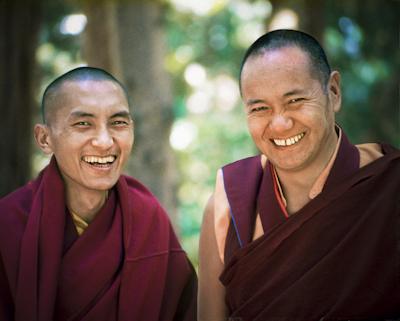Dear LYWA friends and supporters,
As we were putting the finishing touches on this month's eletter, we heard the sad news of the passing of Khensur Jampa Tegchok, a teacher who gave such extensive time and teachings to so many FPMT students at many FPMT centers. You can find more details on the FPMT website, read the LYWA publication The Kindness of Others and find other teachings by Geshe Tegchok on our companion website, TeachingsFromTibet.com.
Below, we have much to share with you about new teachings made available to you in October from the Archive. Thank you so much for your continued interest and support.
New eBook: Teachings from Kopan 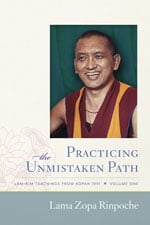 We have just published the first volume of a new ebook series of Lama Zopa Rinpoche's teachings: Practicing the Unmistaken Path: Lamrim Teachings from Kopan 1991. The book was edited by Gordon McDougall and Sandra Smith, and is now available for download from Amazon, Google Play Store and Smashwords; other outlets are forthcoming.
We have just published the first volume of a new ebook series of Lama Zopa Rinpoche's teachings: Practicing the Unmistaken Path: Lamrim Teachings from Kopan 1991. The book was edited by Gordon McDougall and Sandra Smith, and is now available for download from Amazon, Google Play Store and Smashwords; other outlets are forthcoming.
The series will consist of four volumes of lightly edited transcripts that we hope will convey the feeling of being in Nepal for the one-month Kopan course. The first volume covers topics such as compassion and universal responsibility, the benefits of developing bodhicitta, the disadvantages of self-cherishing, and emptiness. You can read an excerpt from this book in our August eletter, and another may be found below as this month's eletter teaching.
This is the first time we have published a book in ebook format only. Doing so enables us to bring you the teachings much more quickly than if we were also preparing it for print. The entire series will eventually be freely available to read or to download from our website, so even if you don't have an ereader you will soon be able to access the teachings online.
Also, if you are an LYWA Member, the book is freely available to download as a pdf or in ebook format from our Members Area.
More New eBook Options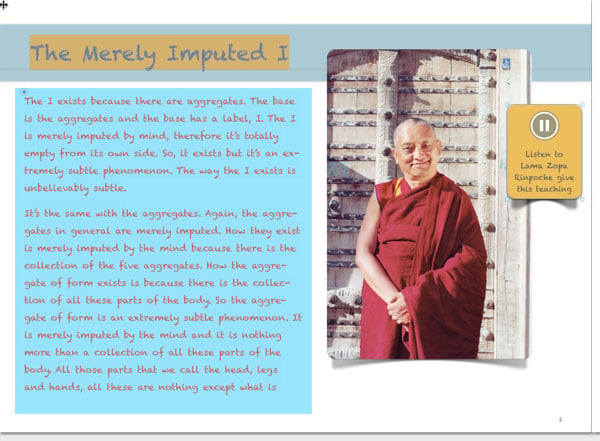 LYWA continues to explore emerging technologies to create multimedia presentations of the Lamas' teachings, supplementing transcripts with audio, video, images and advice. The first books produced were available for iPads: "Making the Most of Your Life" by Lama Yeshe and "The Merely Imputed I" by Lama Zopa Rinpoche.
LYWA continues to explore emerging technologies to create multimedia presentations of the Lamas' teachings, supplementing transcripts with audio, video, images and advice. The first books produced were available for iPads: "Making the Most of Your Life" by Lama Yeshe and "The Merely Imputed I" by Lama Zopa Rinpoche.
We are happy to report that “The Merely Imputed I” is now available as an Inkling multimedia title for either iOS or Android devices! Simply install the Inkling app for your iOS device from the Apple App Store or for your Android device from GooglePlay, then visit the Inkling store to download a free copy of “The Merely Imputed I” for a fresh multimedia experience of Lama Zopa Rinpoche’s clear and profound teachings on emptiness.
We are also thrilled to announce that LYWA ebooks are can now be found in more than 25,000 libraries and schools through Overdrive on iOS, Android, Kindle and Nook devices. Just download the Overdrive app or search your local library for LYWA titles. And if your library doesn’t appear to have LYWA ebooks on its digital shelves yet, you can immediately request that your library make these precious Dharma titles available to all its patrons. Thank you!
What's New on Our Website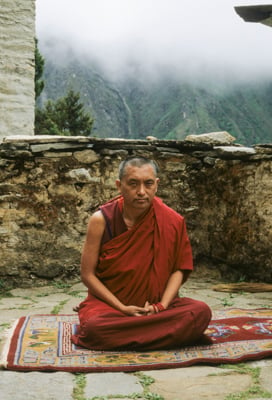 We have just posted Lama Zopa Rinpoche's teachings from Sydney, Australia in November 1990 in which Rinpoche talks about how to free ourselves from problems and find happiness, not just for ourselves but for all beings. Some of these teachings appear in the excellent Wisdom Publications book How to Be Happy.
We have just posted Lama Zopa Rinpoche's teachings from Sydney, Australia in November 1990 in which Rinpoche talks about how to free ourselves from problems and find happiness, not just for ourselves but for all beings. Some of these teachings appear in the excellent Wisdom Publications book How to Be Happy.
Last month we told you about the ebook we published in partnership with Amitabha Buddhist Centre, Khen Rinpoche Geshe Chonyi's Daily Reflections. We have also now posted this entire book on our companion website, TeachingsFromTibet.com.
We are grateful to those who partner with us to make the teachings available in other languages and formats. This month we are happy to share the Russian translation of the lamrim prayer Practicing Guru Devotion with the Nine Attitudes, translated by Zarina Osmonalieva. And our intrepid Braille translator Alan Wilson has provided the Braille version of another of our publications, Life, Death and After Death. This brings the total number of LYWA books available in Braille to nine. Thank you Alan!
Big Love Lama Yeshe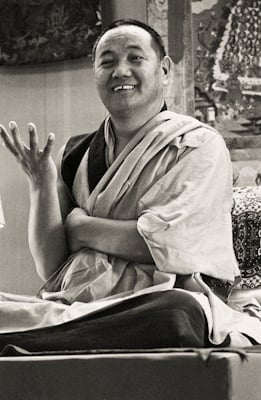 We are steadily making progress on Lama Yeshe's biography Big Love. Work continues on selecting photos to include in the book from our ever-growing collection of archival photos, now numbering nearly 50,000. You can see many of these amazing photos in our Online Image Gallery. We are also completing work on the many maps and diagrams that will also be included in the volume.
We are steadily making progress on Lama Yeshe's biography Big Love. Work continues on selecting photos to include in the book from our ever-growing collection of archival photos, now numbering nearly 50,000. You can see many of these amazing photos in our Online Image Gallery. We are also completing work on the many maps and diagrams that will also be included in the volume.
We continue to post excerpts from the forthcoming biography on our Big Love blog. This month we've posted excerpts and images from the year 1977, including stories from the Lamas' teachings in Yucca Valley, California and their visit with Geshe Sopa in Madison, Wisconsin.
We have also posted to the LYWA YouTube channel video of Lama giving a talk on death and rebirth in Geneva Switzerland in 1983. This talk was part of a weekend seminar on the topic which Lama gave just five months before his own passing. The video is from the DVD Life, Death and After Death, which can be purchased on our website. The edited transcripts of these same teachings can also be found in the free book Life, Death and After Death.
New Advice from Lama Zopa Rinpoche
Speaking of the Kopan one-month course, we have just posted a letter Rinpoche wrote to share with students who were at Kopan doing the retreat just last year, where Rinpoche says:
Dharma is more important than money and all the rest of the worldly things that people believe are important for our happiness. We shouldn’t use this perfect human rebirth just to make money, as a servant to money. We need to work for future lives’ happiness and enlightenment.
You can also read practice advice given by Rinpoche to a student who wrote that she was experiencing bliss while in retreat, advising her to now try to meditate more on emptiness.
Read a long advice from Rinpoche to a student with AIDS, who wanted advice on how how he could best practice the precepts and the Buddha’s teachings, where Rinpoche advises:
Actually in reality, people who practice bodhicitta, thought transformation, even if they have problems, even AIDS or whatever it is, this becomes the best enjoyment. Having a problem is the best enjoyment in the life, whether it is cancer or any problem. You can use your experience, the problem, for sentient beings, taking all sentient beings’ problems and the causes of problems, the delusion and karma, and think you receive these. Receive these in your heart and destroy the ego, the self-cherishing thought, as well as ignorance, the concept of true existence, so you achieve the dharmakaya.
There are many more new advices including the benefits of Vajrasattva practice, and how to have a successful shi-nä practice. As always, you can read all the new advices added this month here.
Retreat with Lama Zopa Rinpoche in Australia
The retreat in Bendigo, Australia has just finished, but you can still see and hear the events by visiting FPMT's livestream page to watch recordings of Rinpoche’s talks and the long life puja. Also, check out Mandala magazine editor Laura Miller's blog on the Mandala website which has an account of each day's events and many fabulous pictures.
And, as we mentioned in our last eletter, LYWA is launching a new website in 2015. We have been hard at work on a new and improved design that will make it easier to find what you are looking for and look better than ever. If you have experience in html or Drupal and can volunteer to help load the new site, please email IT Director Jen Barlow.
Thank you again for your kindness and incredible support.
Much love,
Nick Ribush
Director
This Month's Teaching: Bodhicitta: The Disadvantage of Anger
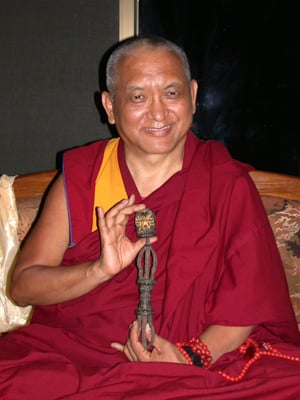 I think there are some problems with the advice given by some areas of the psychology in Western culture. I quite often mention this. But I think nowadays as people’s minds are more open, maybe you use your own wisdom more rather than accepting the psychology, the guidelines written in [psychology] books. Nowadays maybe you should use your own wisdom more, rather than what is written in the books, the methods taught in the past or that have been used.
I think there are some problems with the advice given by some areas of the psychology in Western culture. I quite often mention this. But I think nowadays as people’s minds are more open, maybe you use your own wisdom more rather than accepting the psychology, the guidelines written in [psychology] books. Nowadays maybe you should use your own wisdom more, rather than what is written in the books, the methods taught in the past or that have been used.
As I often mention, I’ve heard so many times that the basic psychological method that is advised for those people who are in an emotional state, such as anger, is to say whatever they want to say. The idea is this. Whatever hurting, bad words we want to say, we feel in the heart; whatever the mind wants to feel, we should express it to the other person, telling them whatever we think. Whatever comes out of anger, we just tell everything to the other person. Probably, that method is more based on us, we who have the problem, for our own interest, for our own happiness.
Expressing whatever the angry mind wants to say, whatever the selfish mind wants to express, the words that come out are only undesirable or hurting words, only hurting others. When we are able to say these things that we have kept inside us, we feel some kind of release. We feel release and rejoice that we have been able to hurt the other person by saying those harmful words to them. We feel that it’s good that we are able to do that, able to hurt them. This method is basically concentrated on being able to show the anger, being able to express the anger. There’s kind of rejoicing or feeling good, especially that we are able to hurt the other person using some powerful words. We label this as happiness and we simply focus on this.
With this method, when we see a person doing something we dislike in the family or in the office or wherever, inside or outside, when the person acts or has a way of speaking or behaving with the body that we dislike, then anger comes. Then we express that anger. We are advised like this to completely, immediately express our anger to that person. Then again in the afternoon, we see either the same person or another person doing something that we dislike, and again anger comes, and again we express that anger, completely, totally. Whatever we have to express with the mind, body and speech, whatever has manifested we express everything. Then again in the evening, somebody—either that same person or whoever—does something that we dislike, and again that anger comes. So again we express it, we let that anger arise, we let that anger explode, to that person or whoever. We say things. Then, it’s the same thing the next day, and this goes on and on. This goes on and on, this week, next week, this month, next month, this year, next year—the same, with no change to the mind. We’ve expressed our anger many times, numberless times, but there’s no development, no change to the attitude. There’s no end to the anger; there’s no end to hurting others.
And as we express our anger to the other person, that becomes the condition for the other person to get angry with us. So, besides ourselves, creating all those various harmful actions or negative karma out of anger [the other person does too].
It goes on like this from year to year. There’s no development, no change at all, with anger becoming less. [If we were to change our attitude,] even if it were still not possible to destroy anger, for there to be the cessation of anger, even if the mind were not developed to that degree, it would be much cleaner, much lighter. Even if anger were to arise, it would be much lighter and shorter, lasting a shorter time. This other way, however, there can’t be this development.
With the same mind it constantly interferes, because we’re not trying to change our own mind. Since we’re not trying to develop our mind, to make it pure, positive, we constantly have the same impure mind looking at things. The same mind constantly interprets because we’re not trying to change our own mind, not trying to develop our mind, to make the mind purer, more positive. Constantly the same impure mind looks at things impurely. The ordinary mind looks at everything as ordinary; the mistaken mind looks at things as mistaken. We look at others’ mistakes or we interpret things the wrong way, the negative way. The mind constantly judges the way others act in the wrong way, as harming us. We interpret the way others act to us as harmful. This ordinary mind, this impure mind, this negative thought looks at things as negative, judging or labeling and believing others’ actions as harmful to us.
Since there’s no mention of developing the mind, purifying the mind, transforming the mind into the positive attitude, what mind there is in life is constantly only the negative, impure, ordinary mind that looks at everything as negative, interpreting others’ actions as bad, as harmful to us. The mind projects these things.
Since there is no change to the mind, the nature of life is always the same, constantly filled with problems. Our life’s experience is constantly filled with problems. This is because our ordinary, impure, negative thoughts, the wrong conceptions, judge or project, labeling things as harmful or bad and believing it. From year to year it constantly goes on like this. Again there is anger, so it’s the same. In early life it’s like this; also in later life it’s the same—the same or maybe worse in the later part of life.
All this happens because the one practice, what is called patience, is not mentioned there. That advice is mentioned nowhere. That one positive attitude, that technique, patience, is never mentioned in the [psychology] guidelines. That’s the problem. That’s why there’s no progression, why we constantly experience the problems again and again. Instead of our anger becoming lighter, briefer in later life, it doesn’t change by the year or month. There’s no development of the mind in a month, a year, even in the whole life.
Excerpted from the recently released ebook, Practicing the Unmistaken Path: Lamrim Teachings from Kopan 1991, Lama Zopa Rinpoche's teachings at the Twenty-fourth Kopan course in Nepal.
























